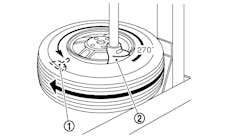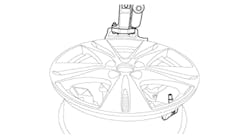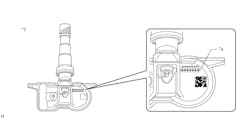Deception, suspense, even a police chase — the employees of Wonderland Tire did not need to go to a theater for a bit of Hollywood drama one hot summer afternoon in August. It all unfolded in their own tire shop.
For those involved, the experience generated more excitement than any motion picture. Score one for the good guys. They literally had caught a thief.
Modus operandi
The action began around lunchtime when a customer walked into the showroom of the tire dealership in Byron Center, Mich. No one was at the front desk, so one of the shop employees called for Nate Dykstra, assistant manager, to man the counter.
The customer was looking for a set of Bridgestone truck tires. Nate advised him that the particular tire he asked for was not in stock and suggested a set of Falken tires instead. The customer agreed, perhaps a bit too quickly, Nate thought.
Nate closed the sale and the customer wrote a check for $1,800, which he placed on the counter. At that moment, the transaction changed from routine purchase to potential crime. Nate had recognized the name imprinted on the check. It was that of a man suspected of paying for merchandise at local businesses with checks drawn on a closed account.
Nate never dreamed the suspect would make it to Wonderland, but here he was with checkbook in hand. His mind was racing, yet in a performance worthy of Hollywood’s best, he kept the shock from showing on his face. Nate triumphantly thought, “Now we’ve got him.”
Calmly, Nate told the man he needed to go into his office to finish writing up the bill and make it tax exempt. That was, of course, a diversion.
Nate hastily scrawled the man’s name on a yellow note pad and placed it on the desk of Ryan Brunsting as he walked past. Ryan, who is manager of the Wonderland store, read the name. He recalls thinking to himself, “Who is that, and why do I recognize that name?” Suddenly, he knew the answer.
Ryan walked out of his office and past the customer to the office of Jim DeVries, chief financial officer for Wonderland. Ryan asked Jim to call the police. Meanwhile, Nate kept the man occupied at the front desk with small talk about his business, truck and trailer, and other topics.
Within five minutes of the call to authorities, a police car raced into the parking lot. The suspect’s pickup truck was parked in front of the entrance to the Wonderland shop. His companion was seated in the truck.
When the first police car appeared, the man in the truck jumped out, raced through the Wonderland shop and out the open overhead doors to a nearby gas station. Seeing a second police car pull in to the parking lot, the suspect who wrote the check ran out the front door toward the same gas station.
Shop employees directed the police to the gas station, where the suspects were caught in the rest room flushing the fraudulent checks down a toilet. The checks were salvaged for use as evidence.
[PAGEBREAK]
The backstory
The real-world drama at Wonderland actually began in late July. The suspects had successfully targeted several businesses in the Grand Rapids area, including tire dealerships. Employees at two of those shops took the initiative to warn other tire stores, their competitors, to be on the lookout.
Wonderland received a telephone call from a person who said his tire shop had lost a large amount of money to a customer who paid with a fraudulent check. No other details were offered. A few days later, on July 31, Ryan received a telephone call from Belleroc Tire Service, a joint venture between Tredroc Tire Service and Belle Tire that consists of six retail locations and one Bandag retread plant.
The caller, Mike Dykstra (no relation to Nate), general manager of the Belleroc store in Byron Center, gave the name and description of a man who had paid for medium truck tires with a fraudulent check.
“Perhaps the common thing to do would be to keep quiet about it and let the other tire companies deal with it on their own if the man tries it on them,” said Dave Langerak, a co-owner of Wonderland Tire. “These good employees did not do that. They alerted us to what had happened to them. We are grateful. This allowed us to identify the man when he came to us. Without those phone calls we probably would have been taken for some tires, as well.”
Founded in 1978, Wonderland is a family-owned business with 70 employees and five locations in the west Michigan area and Chicago. The company specializes in tires and tire-related services for passenger vehicles, light trucks and commercial trucks. Wonderland Tire technicians are TIA (Tire Industry Association) certified by an in-house certified trainer for both commercial tire service (CTS) and automotive tire service (ATS). Company-wide, about 50% of revenue is generated from sales of Wonderland’s AcuTread remanufactured truck tires, which are produced via a proprietary retread process.
Belleroc’s retread plant, located in Grand Rapids, Mich., has been in operation using the Bandag process since 1987. The process is now part of Bridgestone Commercial Services, a division of Bridgestone Americas Tire Operations (BATO).
All service technicians and salesmen are TIA certified. Belleroc’s service extends to all segments — including retail, OTR and commercial. Belleroc Tire Service includes locations in Michigan; Tredroc Tire Service includes locations in Illinois, Wisconsin and Indiana; and Belle Tire includes locations in eastern Michigan and northern Ohio.
After getting the call from Belleroc, Ryan alerted managers at all Wonderland locations to the check scheme via email. The suspect was probably feeling very confident as he strolled into Wonderland. He had just purchased four large truck batteries with a fraudulent check at a nearby truck dealership.
“Nate helped this man when he came in to our store and identified him as the check fraud suspect. Nate would probably tell you he was just doing his job. He is an intelligent and dedicated employee who no doubt received a lot of satisfaction from being the one who caught this guy. Nate, Ryan and Jim are all very good company employees who care for the well-being of Wonderland Tire and treat it as is if it were their own company,” said Dave.
Tough to spot
Checks are usually the preferred payment method for customers without credit cards. But both check and credit card fraud are major threats to the financial health of any business.
The retail industry loses $12 billion a year to bad checks, with industry estimates attributing half of those losses to check fraud according to the website of SCORE, a nonprofit organization dedicated to the success of small businesses.
Most businesses want to make multiple forms of payment available for the convenience of their customers. Despite precautions at checkout, a bad check may still slip by.
“This one would have been very difficult to prevent if we had not been alerted first by other local tire companies,” said Dave. “The man had what appeared to be a valid I.D. in the form of a driver’s license. That is typically what we would ask to see for a check of any amount.”
At Belleroc Tire, the suspect came into the shop twice in the same week. He mentioned the names of several familiar Belleroc customers, which gave him some credibility, according to Mike.
“He was so brazen. He gave us his identification and signed documents with his name. The check was from a major bank and he provided a phone number along with his I.D. There was nothing to give the appearance that it was not a legitimate check,” Mike said.
After the bank notified Belleroc that the check was written on a closed account, Mike called the local sheriff to file a report. His next move was to call area tire dealers, a step that led to the arrest of the two suspects.
[PAGEBREAK]
Valuable lesson
The drama did not end with the arrest at the gas station.
Excitement was still running high when the police asked tire technician George Moore to make sure the suspect’s truck could not be driven off. Rather than remove the key from the ignition, he popped the hood and pulled out the spark plugs. As the truck was towed away, everyone, including the policeman, shared some laughs as well as a lesson.
“I think there is a valuable lesson to be learned here: Communicate with one another when something like this happens. This man hit many local businesses with this same check falsification scheme, and several were local tire companies.
“Even though we are competitors in the marketplace, there is room for cooperation when it comes to something like this,” said Dave.
Earl Kamps, also a co-owner of Wonderland Tire, added: “Our employees did a great job. They kept their cool and nabbed this guy. It would be ideal if tire dealers would inform each other when scams arise so we can shut down these criminals.”
Mike from Belleroc echoes the sentiment: “We fight each other every day out there, but we have to stick together on some things.”
Sticking together to prevent financial crime works. Need proof? The suspect was charged as a habitual offender as well as with false pretenses. He is awaiting trial. ■
Tips for accepting checks
A variety of electronic and paper check processing solutions are available commercially, including technology that converts paper checks into an electronic transaction at the point of sale and transfers funds directly from a customer’s checking account to the retailer’s business account.
For merchants accepting traditional paper checks, verifying that the person offering the check is the account holder can help prevent fraud. Retail chains usually access account and cardholder databases for identity verification and payment authorization.
Smaller merchants often do not have that option.
Local banks and law enforcement should be able to provide tips for specific actions to detect check and card fraud at checkout. The U.S. Small Business Administration offers these guidelines (www.sba.gov/content/accepting-checks) for detecting fraudulent checks at the point of sale:
• Checks must be from a local or in-state bank.
• Checks should not be written and accepted for more than the purchase amount.
• Checks should not be accepted that are starter checks, unnumbered checks, ornon-personalized checks.
• Accepted checks should be deposited as quickly as possible. Banks may refuse to honor checks dated back six months or more.
Instruct employees to carefully examine every personal check for information that is essential for chasing the check:
• Personalization – The customer’s complete name and address must appear on the check.
• Date – The check date must be current. Do not accept post – or future-dated checks.
• Bank I.D. numbers – The check must have a bank identification number, or routing transit number, that runs across the bottom, along with the customer’s account number and check number. This information is used by a bank to identify the transaction and resolve payment issues.
• Payee – The “Pay to the Order of” section must indicate your business’s name.
• Dollar amounts – Both the written and numeric amounts must match.
• Customer signature – The check should be signed in your presence and verified with photo identification.
• Verifying identification can help your business safeguard against fraud. However, some state laws regulate which forms of identification businesses can require to see.
Depending on your business location, it may be illegal to require customers to show a credit card as a condition for accepting their check. Commonly accepted forms of identification often include a state-issued driver’s license, I.D. card, or military I.D.
Source: www.sba.gov/content/accepting-checks
Ann Neal is a freelance writer with more than two decades of experience managing employee, financial and marketing communications and Web content in the commercial trucking industry.




